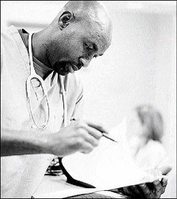Doctors make an overtime windfall
Published: Sunday | November 1, 2009

Doctors performing heart surgery at a hospital in Kingston. There is a possible move afoot to put doctors on a shift system.- File photos
SOME DOCTORS working in the public-health system are swimming in gravy of overtime payments, a recent examination of medical salaries conducted by the Government has revealed.
The report, which highly placed government officials have described as preliminary, has been kept close to the chest by Health Minister Rudyard Spencer, who is due to meet with doctors about the situation tomorrow.
However, The Sunday Gleaner has been privy to sections of the report, which was done after a four-month survey in one regional health authority. The report said that basic salaries for doctors in that region were a third of the salaries that doctors received. The remaining two-thirds comprised other payments, such as rostered duties and on-call payments.
The report said $94 million was spent on the basic pay for doctors in the region for the four-month period, and another $250 million was spent on "other pay".
the breakdown
Doctors in the public-health system receive a combined salary of basic pay, which is earned between their normal working hours of 8 a.m. and 4 p.m.; rostered payment for hours worked after 4 p.m.; sessions pay whenever they work in the accident and emergency department after their normal hours; on-call; and, other allowances.
The agreement between the doctors and Government dates back to 1993 when Desmond Leakey was minister of health.
However, there appears to be a potential stand-off between Government and the doctors. The Sunday Gleaner has been flooded with calls from doctors who have said that whispers in medical circles are increasing in decibel level as concern and opposition mount about a possible move to put doctors on a shift system.
A senior government source neither confirmed nor denied the speculation. He, however, said that Government was considering the recommendations of the preliminary report done recently.
The source said that a move to revisit the arrangements under which doctors are paid would not violate any labour laws, neither would it be in breach of any heads of agreement.
"What is being proposed is that doctors work any eight hours in a 24-hour day and any five days in the week," the government official said.
possible savings
If the proposal is accepted, each regional health authority could save a minimum of $10 million monthly in 'overtime' payment to doctors.
"Early predictions are that if we were to engage the services of 100 new doctors, whether locally or overseas, the Ministry of Health would, realise savings of $500 million, which can be ploughed back into the health system to ensure that the citizens receive proper care. It would also greatly relieve the stress on those doctors that are overworked," a government official said.
But it seems unlikely that these human engineers are likely to be accommodating of Government's proposal for more flexible work hours. One doctor told The Sunday Gleaner that if they were to survive on basic salaries alone, they would be "poorly, poorly paid".
However, the doctor maintains that "it has nothing to do with salaries. If what I am hearing is true, it is just not feasible for patient care", the doctor said.
Medical Association of Jamaica President Dr Winston De La Haye has warned that "any proposed cost-saving measure which has the potential to adversely affect patient care and health-service delivery in Jamaica will not be supported by the medical fraternity".
One hospital CEO told The Sunday Gleaner that there was a clear need for a more flexible arrangement with regard to the way doctors were scheduled to work.
needs revisited
"It was a bad arrangement that needs to be revisited. I don't think there is any 24-hour operation that can efficiently operate in this way," the CEO said.
It is a view shared by Dr Fenton Ferguson, the opposition spokesman on health. "Why would you put all your critical-care people to work at the same time?" Ferguson said.
Ferguson, however, told The Sunday Gleaner that while he had heard of the impending move to institute a more flexible system in the hospital, he needed more time to consider the implications for patient care.
"I would not give a knee-jerk reaction to that new policy. It is something that would require detailed examination," Ferguson said.
Regional health authorities spend an average of 75 per cent of their budget on salaries. The remaining 25 per cent is used to purchase drugs and equipment and pay utilities for health facilities. Some $26.8 billion is being spent this year on the delivery of health care.

A recent examination of medical salaries conducted by Government has revealed that some doctors are making excessive sums in overtime payments.









